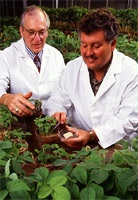How Do I Determine the Quality of Essential Oils?

 The quality of essential oils can vary widely. As a consumer (and even as an aromatherapist), it is difficult to assess quality. Essential oils come from all over the world, and suppliers or companies usually obtain oils from farmers or wholesalers whose practices and integrity they have come to trust over time. The end consumer would not be aware of (or have the capability to assess) those relationships and practices. For those interested in learning more about regulating bodies and certifying organizations, some information and links are provided below.
The quality of essential oils can vary widely. As a consumer (and even as an aromatherapist), it is difficult to assess quality. Essential oils come from all over the world, and suppliers or companies usually obtain oils from farmers or wholesalers whose practices and integrity they have come to trust over time. The end consumer would not be aware of (or have the capability to assess) those relationships and practices. For those interested in learning more about regulating bodies and certifying organizations, some information and links are provided below.
How are essential oils regulated?
Under the Federal Food, Drug, and Cosmetic Act and the Dietary Supplement Health and Education Act, the Food and Drug Administration (FDA) has responsibility for regulating foods, food additives, drugs, cosmetics, and dietary supplements. The legal difference between these categories is determined by the product's intended use.
The FDA considers essential oils either cosmetics or drugs, depending on their intended use. The FDA makes decisions concerning the regulation of essential oils on a case-by-case basis. For example, if a company claimed that the aroma of an essential oil promoted attractiveness, the FDA would most likely regulate the product as a cosmetic. If a company claimed that an essential oil was effective as an aid for quitting smoking or in treating or preventing any other condition or disease, the FDA is more likely to regulate the product as a drug.
Cosmetics or drugs—does it matter?
Cosmetics and drugs are regulated very differently. Although a few researchers have obtained FDA approval to conduct research on essential oils used therapeutically (as drugs), most essential oils are not considered drugs by official agencies. Thus, they are available to anyone without a prescription and questions of quality are handled as for cosmetics, foods, and flavoring agents.
Who governs advertising claims?
Claims made in advertising, but not on product labeling, are regulated by the Federal Trade Commission (although advertising claims can be used to establish a product's intended use). Room fragrance systems (deodorizers, odor control) are the responsibility of the Consumer Product Safety Commission.
What about regulations around the world?
Various agencies abroad have been proactive in setting standards for essential oil quality. Examples of these agencies include:
- AFNOR (Association Francaise de Normalisation) Their "New Approach" provides directives and standards for members of the European Union states to facilitate intra-community trade. All companies wishing to exchange goods within Europe are therefore obliged to comply with their directives. For essential oils, they provide guidelines and information on various topics including determination of water content, chromatographic profiles, determination of acid value, content of phenols, etc.
- ISO (International Organization for Standardization) Their mission is to promote the development of standardization in the areas of intellectual, scientific, technological, and economic activity. For essential oils, they provide guidelines for packaging, conditioning, storage, labeling, sampling, testing, etc. ISO also provides, for a fee, quality standards for individual essential oils.
What can impact quality?
There are a number of ways in which the quality of essential oils can be compromised-from the growing conditions of the plants to their harvesting, distillation, manufacture, distribution, and storage.
 Plants: The quality of essential oils can be negatively impacted by the use of pesticides and other chemicals, the variability in altitude, soil conditions and rainfall, and the difficulty of differentiating plant species and varieties.
Plants: The quality of essential oils can be negatively impacted by the use of pesticides and other chemicals, the variability in altitude, soil conditions and rainfall, and the difficulty of differentiating plant species and varieties.- Processing: Because of the growing popularity of essential oils and aromatherapy, there are many products on the market that may not be suitable for clinical use. They can be found nearly everywhere, from health food stores to discount stores to the Internet. These products may include pure essential oils, but sometimes they are adulterated or diluted. Such adulterations are difficult to identify.
- Packaging and handling: Other considerations include packaging, storage, and handling. Chemical degradation can occur with exposure to heat, light, or oxygen. Essential oils from citrus products are especially prone to oxidation that can quickly alter the chemistry of those essential oils.
- Storage: Essential oils should be stored in tightly closed, darkened glass containers in a cool place to ensure lasting quality (Buckle, 2003; Tisserand & Balacs, 1995). We recommend writing the date on the bottle after opening it so you can keep track of your own essential oils. Oxidation rates vary, but most essential oils can be safely used for 1-2 years or more after opening.
How do I find quality essential oils?
Because standards for quality control of essential oils do not currently exist in the United States, it is important to find reputable sources that sell good quality essential oils if you are planning to use them for health-related purposes. Whether you buy essential oils in a store, from an individual, or from the internet, be sure to read any information provided on the label or website, or ask questions about quality.
Some important considerations
- Is the Latin name of the plant provided so that you are sure you are getting the right essential oil? For example, there are several species of lavender.
- Is the name of the country in which the plants were grown provided? A consumer would not be expected to differentiate oils from different countries, but this information is important to aromatherapists because quality can vary by country. This is an indication that the company is marketing to knowledgeable parties as well as general consumers.
- Is there a statement about purity? You should be informed if it is not 100% essential oil (meaning, it has been altered or mixed with something else).
- Is the cost comparable in comparison with other brands of the same essential oil? If it's really cheap, it probably isn't the real thing.
- Does it smell as you expect it to smell?
- Is there information about organic growing or wildcrafting (gathering wild plants)? Most essential oils sold in the U.S. are not certified as to their organic status, but some European brands are.
Buckle, J. (2003). Clinical aromatherapy: Essential oils in practice, 2nd Ed. Edinburgh: Churchill Livingstone.
Price, S. & Price, L. (2007). Aromatherapy for health professionals, 3rd Ed. Philadelphia: Churchill Livingstone Elsevier.
Tisserand, R. & Balacs, T. (1995). Essential oil safety: A guide for health professionals. Edinburgh: Churchill Livingstone.